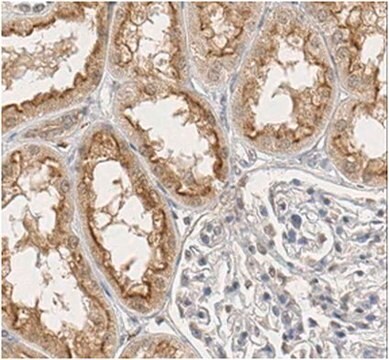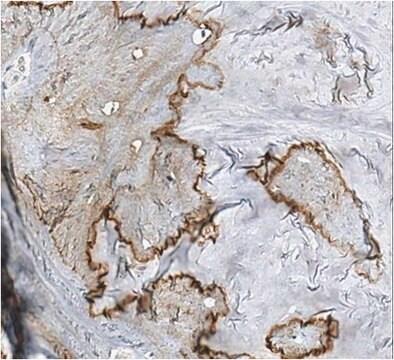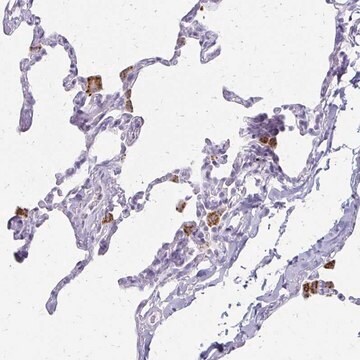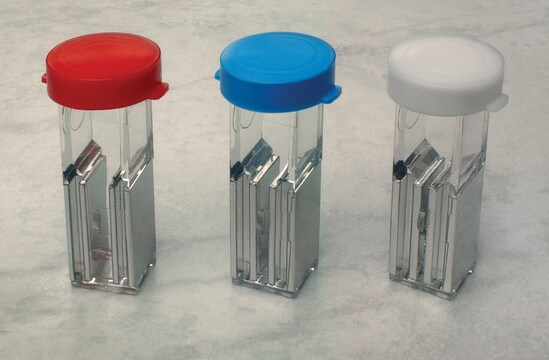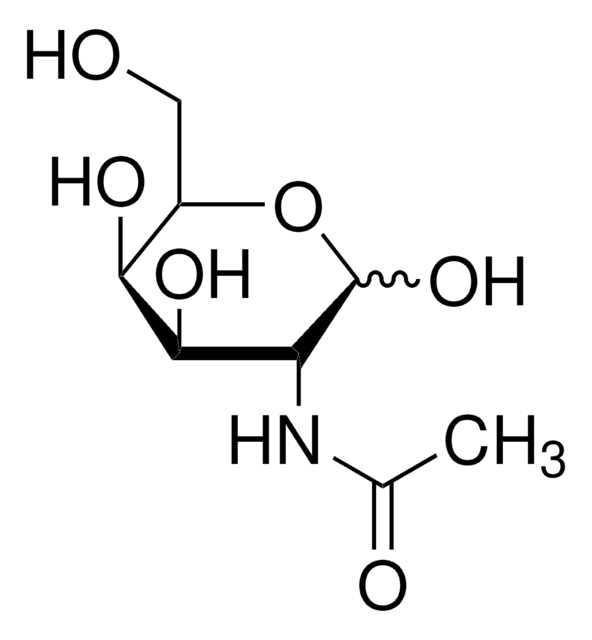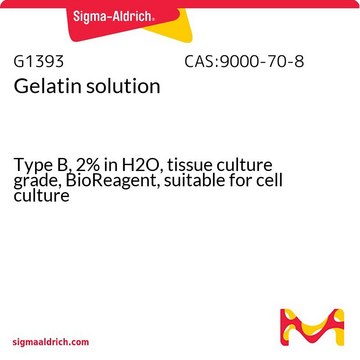おすすめの製品
由来生物
goat
品質水準
結合体
unconjugated
抗体製品の状態
affinity isolated antibody
抗体製品タイプ
primary antibodies
クローン
polyclonal
形状
lyophilized powder
化学種の反応性
mouse
テクニック
immunohistochemistry: 5-15 μg/mL
neutralization: suitable
western blot: 0.1-0.2 μg/mL
UniProtアクセッション番号
保管温度
−20°C
ターゲットの翻訳後修飾
unmodified
遺伝子情報
mouse ... Tnfrsf11b(18383)
詳細
Osteoprotegerin (OPG) secreted by osteoblasts and osteogenis stromal stem cells belongs to the TNF receptor superfamily. OPG is expressed in bone marrow, osteoblasts, heart, lung, kidney, thymus, B lymphocytes, chondrocytes and smooth muscle cells. The ratio of OPG and receptor activator of NF-κB Ligand (RANKL) is crucial determining the bone mass. Receptor activator of NF-κB (RANK)/RANKL/OPG axis decides the bone biology. OPG binds RANKL and prevents the activation of osteoclasts, the cells that deplete bone mass. Excess levels of OPG lead to osteopetrosis while deficiency results in osteoporosis. The RANK/RANKL/OPG pathway mediates the activation of multiple pathways such as NF-κB, Akt, JNK, and MAPK
Anti-osteoprotegerin specifically reacts with recombinant mouse OPG. The antibody may cross react with human OPG (25% homology).
Anti-osteoprotegerin specifically reacts with recombinant mouse OPG. The antibody may cross react with human OPG (25% homology).
特異性
The antibody has the ability to neutralize the biological activity of recombinant mouse OPG.
免疫原
purified recombinant mouse osteoprotegerin expressed in mouse NSO cells.
アプリケーション
Anti-osteoprotegerin antibody may be used to neutralize mouse OPG at neutralization dose (ND50) of 0.5-2 μg/ml. The antibody is suitable for immunoblotting at a working concentration of 0.1-0.2 μg/ml.
物理的形状
凍結乾燥品(PBS溶液, 5%トレハロース含有, 0.2 μmフィルター滅菌済み)。
免責事項
Unless otherwise stated in our catalog or other company documentation accompanying the product(s), our products are intended for research use only and are not to be used for any other purpose, which includes but is not limited to, unauthorized commercial uses, in vitro diagnostic uses, ex vivo or in vivo therapeutic uses or any type of consumption or application to humans or animals.
適切な製品が見つかりませんか。
製品選択ツール.をお試しください
保管分類コード
11 - Combustible Solids
WGK
WGK 1
引火点(°F)
Not applicable
引火点(℃)
Not applicable
個人用保護具 (PPE)
Eyeshields, Gloves, type N95 (US)
適用法令
試験研究用途を考慮した関連法令を主に挙げております。化学物質以外については、一部の情報のみ提供しています。 製品を安全かつ合法的に使用することは、使用者の義務です。最新情報により修正される場合があります。WEBの反映には時間を要することがあるため、適宜SDSをご参照ください。
Jan Code
O1139-100UG-PW:
O1139-BULK:
O1139-VAR:
O1139-100UG:
試験成績書(COA)
製品のロット番号・バッチ番号を入力して、試験成績書(COA) を検索できます。ロット番号・バッチ番号は、製品ラベルに「Lot」または「Batch」に続いて記載されています。
Brendan F Boyce et al.
Current osteoporosis reports, 5(3), 98-104 (2007-10-11)
Understanding of osteoclast formation and activation has advanced considerably since the discovery of the RANKL/RANK/OPG system in the mid 1990s. Osteoblasts and stromal stem cells express receptor activator of NF-jB ligand (RANKL), which binds to its receptor, RANK, on the
Anne-Priscille Trouvin et al.
Clinical interventions in aging, 5, 345-354 (2011-01-14)
Bone remodeling requires a precise balance between resorption and formation. It is a complex process that involves numerous factors: hormones, growth factors, vitamins, and cytokines, and notably osteoprotegerin (OPG) and receptor activator for nuclear factor-κB (RANK) ligand. The signaling pathway
Shabber Syed et al.
Journal of cardiovascular development and disease, 9(8) (2022-08-26)
Calcific aortic valve disease (CAVD) is a common cardiac defect, particularly in the aging population. While several risk factors, such as bi-leaflet valve structure and old age, have been identified in CAVD pathogenesis, molecular mechanisms resulting in this condition are
I Silva et al.
Acta reumatologica portuguesa, 36(3), 209-218 (2011-11-25)
The discovery of the receptor activator of nuclear factor-kB (RANK)/RANK Ligand (RANKL)/osteoprotegerin (OPG) pathway contributed to the understanding of how bone formation and resorption were processed and regulated. RANKL and OPG are members of the tumor necrosis factor (TNF) and
W C Dougall et al.
Genes & development, 13(18), 2412-2424 (1999-09-29)
The physiological role of the TNF receptor (TNFR) family member, RANK, was investigated by generating RANK-deficient mice. RANK(-/-) mice were characterized by profound osteopetrosis resulting from an apparent block in osteoclast differentiation. RANK expression was not required for the commitment
ライフサイエンス、有機合成、材料科学、クロマトグラフィー、分析など、あらゆる分野の研究に経験のあるメンバーがおります。.
製品に関するお問い合わせはこちら(テクニカルサービス)
